March 23, 2023
How ITDP India is ‘Gamifying’ Urban Transport Planning
In 2020, ITDP India launched two national programmes with the Government of India’s Smart Cities Mission — the India Cycles4Change and Streets4People Challenges — aimed at building the capacity of officials from over 100 cities to create healthier, safer, and more inclusive streets.
Originally Authored By Smritika Srinivasan and Keshav Suryanarayanan, ITDP India
Through these programmes, ITDP India has developed over 100 toolkits and conducted over 35 workshops over the last three years. For over two decades, the team in India has been building the capacity of city officials in planning and implementing sustainable transport initiatives that prioritize low-carbon mobility, access, and innovation. Throughout this work, the India team has piloted and tested various engagement strategies with stakeholders, ranging from government leaders to community groups, through workshops, presentations, toolkits, templates, study tours, hands-on exercises and beyond. Learning from these efforts, they have also refined and scaled up the approaches they have found most effective.
As part of the national programmes, the India team also wanted cities to create a realistic three-year action plan towards implementing Healthy Streets that would include building institutional support and political will while conducting campaigns to encourage behavior change amongst communities to do more walking and cycling. To ensure a more ‘hands-on’ experience, ITDP India decided to develop and test something new — an urban transport game. Launched at a national workshop in 2022, this game brought together officials from a range of cities participating in both the national programmes, yielding some interesting results that can be applied to all those looking for creative, solutions-focused engagement methods for urban and transport planning.
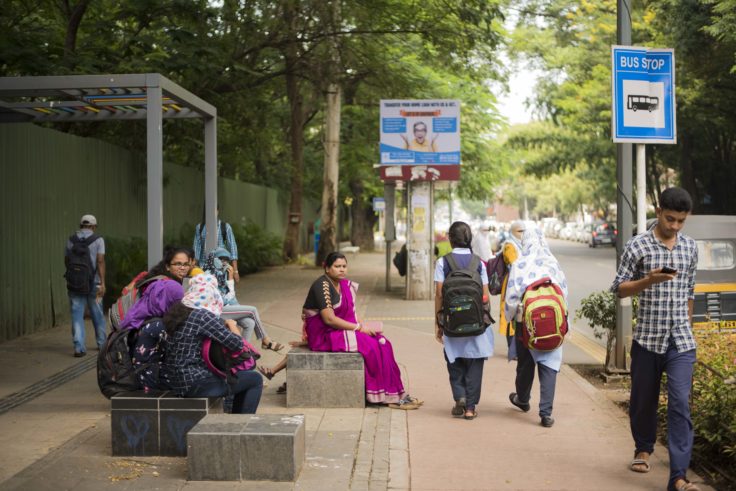
Learning from Games
Games have always been part of the urban planning process, especially when it comes to engaging with the community. Play the City, Imaginable Guidelines, and Kuwaitscapes are some examples from around the world that have helped various stakeholders better understand and re-envision city life. While this was the first time ITDP India was designing a game from scratch, this was not the first time the team has used games to engage with city officials, and they refined this recent approach based on learnings from previous efforts. In 2019, ITDP India designed a board game on parking pricing as a tool for parking management, based on a game developed by Dr. Paul Barter, a Singapore-based urban transport expert. The team also studied various games to inform the development of their own, and identified some common desirable elements amongst them:
- Ensuring collaboration and participation: It is important to get participants to debate and discuss their ideas as they make key decisions together within a particular context.
- Playing the game in smaller groups: While playing in large groups, the voices of some players may not be heard. Smaller groups can help all players have an equal opportunity to participate.
- Creating space for players to add ideas: A new and innovative idea can come from anyone, and providing space for everyone to voice ideas would allow all players to be more actively involved.
Keeping these learnings in mind, the team started brainstorming various methods to develop a new game, following the process outlined below.
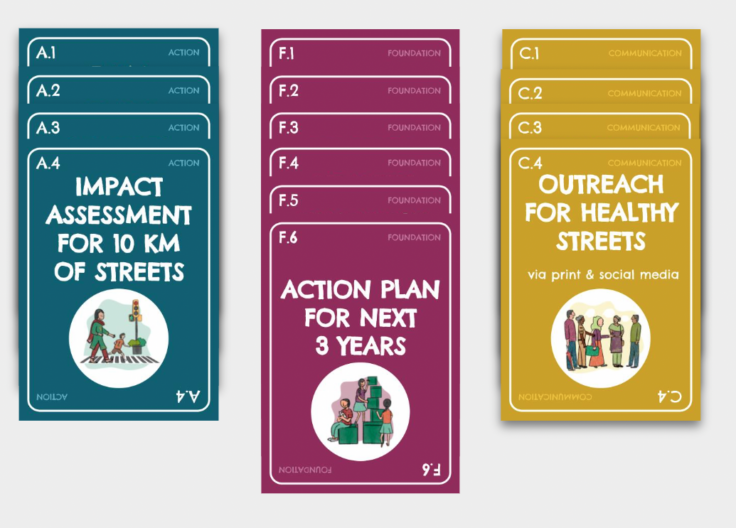
Structuring the Game
The goal of this exercise was to build a game that can help city officials quickly identify clear actions they can take in a three-year period towards creating Healthy Streets in their cities. ITDP India also wanted them to understand the importance of updating this action plan at the end of every three years to ensure that it reflected current conditions. This understanding helped to inform the format of the game:
- The game would be set in a fictional city of ‘Malgudi’ for which the participants would develop an action plan to create Healthy Streets.
- Each team was handed a context card to help understand the setting better with details about the city and its previous Healthy Streets initiatives.
- The game was to be played in three rounds, each round representing one year.
- In each round, participants would choose a certain number of actions the city could take from a a list of options, with a clear reasoning for each of them.
- After each round, the participants would be given information to help them evaluate the actions they chose and inform their selection in the next round.
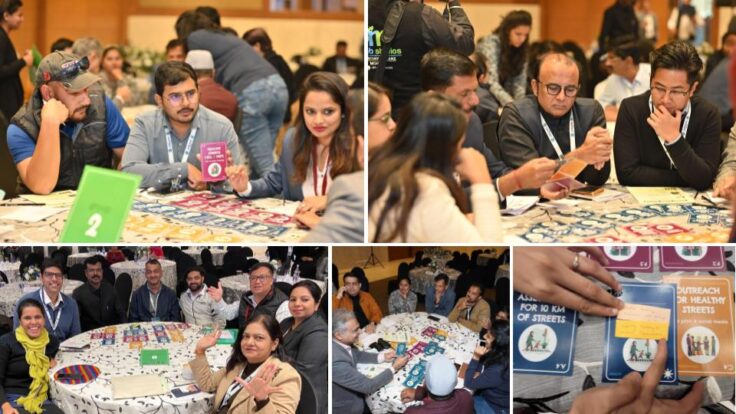
Getting to the Details
ITDP India curated the game while keeping five principles in mind:
- Design the game to be simple enough to be understood and played quickly: For the participants to quickly grasp the game concepts and use their time to have meaningful conversations, the team designed it as a card-based game. They also focused on simplifying the design of the cards and making sure the information on the cards was brief, clear, and actionable.
- Identify key messages for the participants to take away from the game: The team wanted the participants to understand the goals they were setting and how to prioritize them in each round. The game play and the instructions were designed to ensure they received this information clearly after each round.
- Create the space for players to make not-so-great decisions and learn from them: The team wanted the participants to make “mistakes”, but also give them an opportunity to learn from them and fix them in the next round.
- Design the game to have no “winners” to reinforce the idea that there is no “right” or “wrong” final outcome: The overall outcome was to create a three-year action plan to create Healthy Streets in the fictional setting. The goal was to get the participants to develop their own action plans based on solid reasoning, not to get all of them to develop the same “correct” plan.
- Add an element of fun and excitement for the players: ITDP India tried to find ways to get the participants excited about the game by using GIFs to simplify and explain the rules in an engaging way, and by adding bonus cards — blank cards for the participants to add their own out-of-the-box ideas during play — that they could earn through each round.
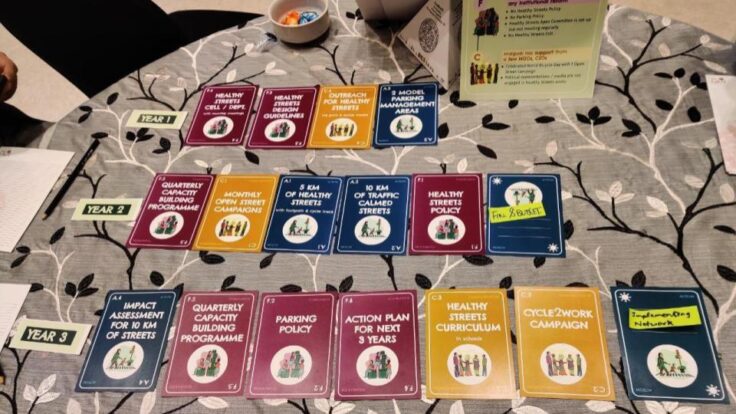
Playing the Game
During a national Healthy Streets Capacity Development workshop in December 2022, ITDP India played the game for nearly two hours with 100+ city officials from 38 cities across the country. The participants were split into teams of 10, with each team supported by a table moderator from ITDP India. Two facilitators took the stage and introduced the entire game to the participants while moderators for each table helped the teams navigate the game.
The format enabled participants to jump right into the process of ideation and discussion. The playful nature of the game brought out the “inner-child” in the participants — including senior city officials — and participants were excited not just to participate, but to debate and make decisions together while sharing thought processes and insights aloud with their peers.
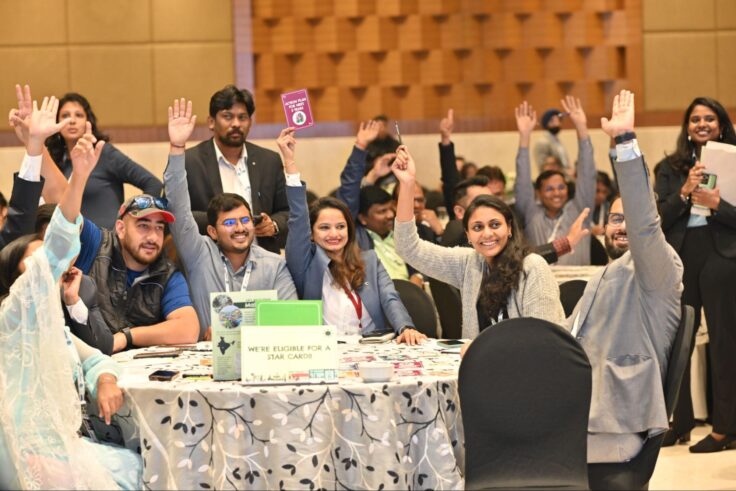
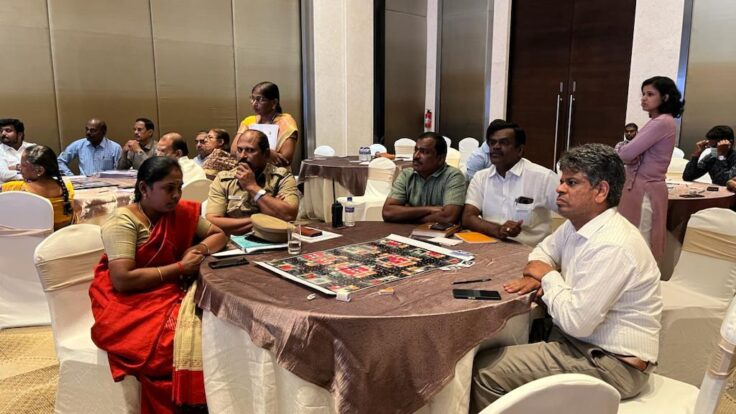
Moving Forward
ITDP India hopes that the game will be a starting point for representatives from these Indian cities to create robust and adaptive Healthy Streets Action Plans — living documents that evolve with the city in response to the needs of its residents. The game will also evolve based on learnings from tests and feedback from the city officials who engage with it. The team hopes to keep building on the game by adding layers of real-world complexities into it and including specific aspects of urban decision-making processes, like budgeting and participatory planning, without losing sight of the core principles of creativity and collaboration in the process.
As more Indian cities move towards creating Healthy Streets and embracing sustainable transport, ITDP India is certain that creative strategies like these games can help promote more learning, teamwork, and knowledge-sharing amongst decision-makers. As the local team continues to improve this card game and even develop new ones, they also look forward to supporting partner organizations who are interested in testing similar methods to bring a new light into urban and transport planning.
Stay updated on ITDP India’s work >>
